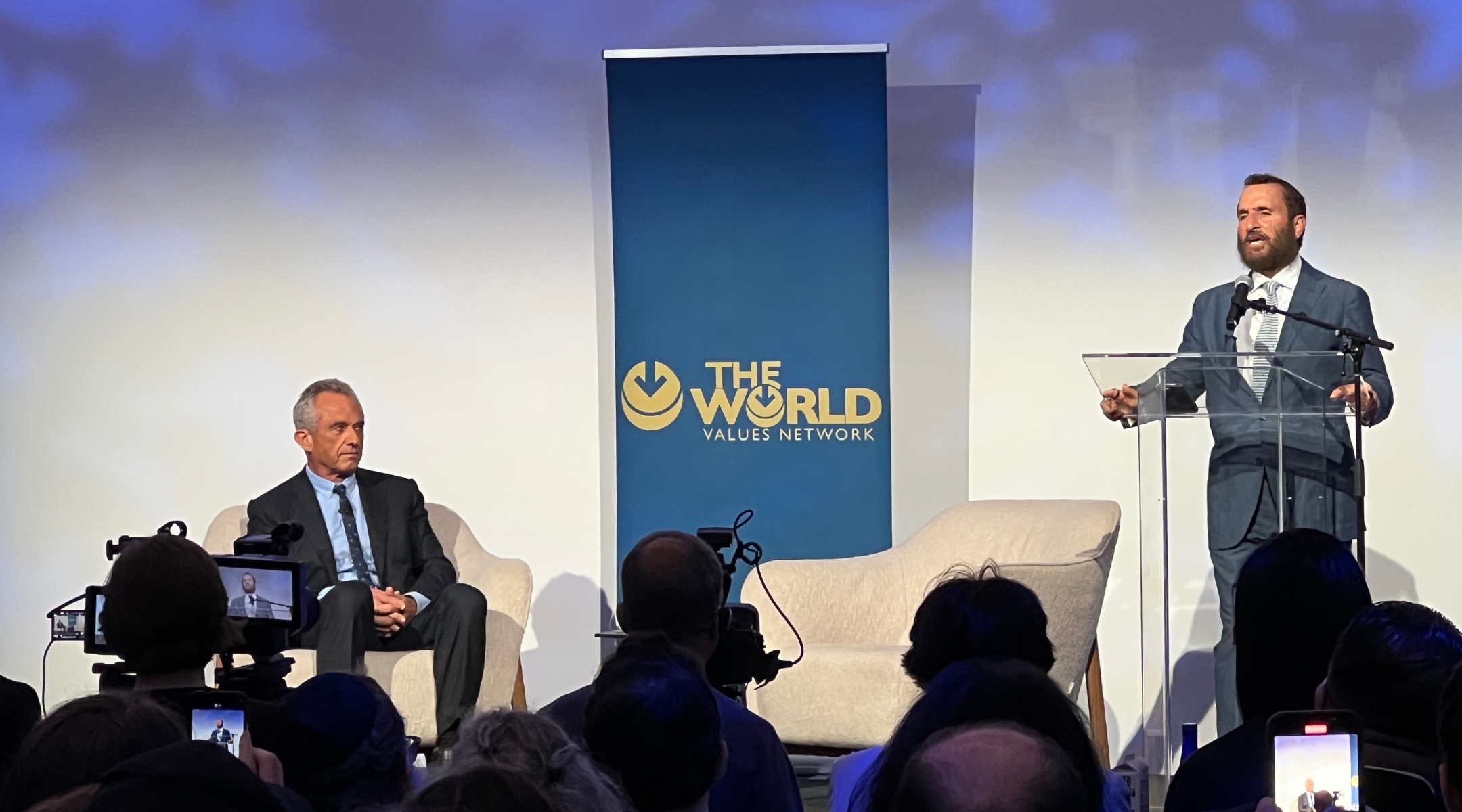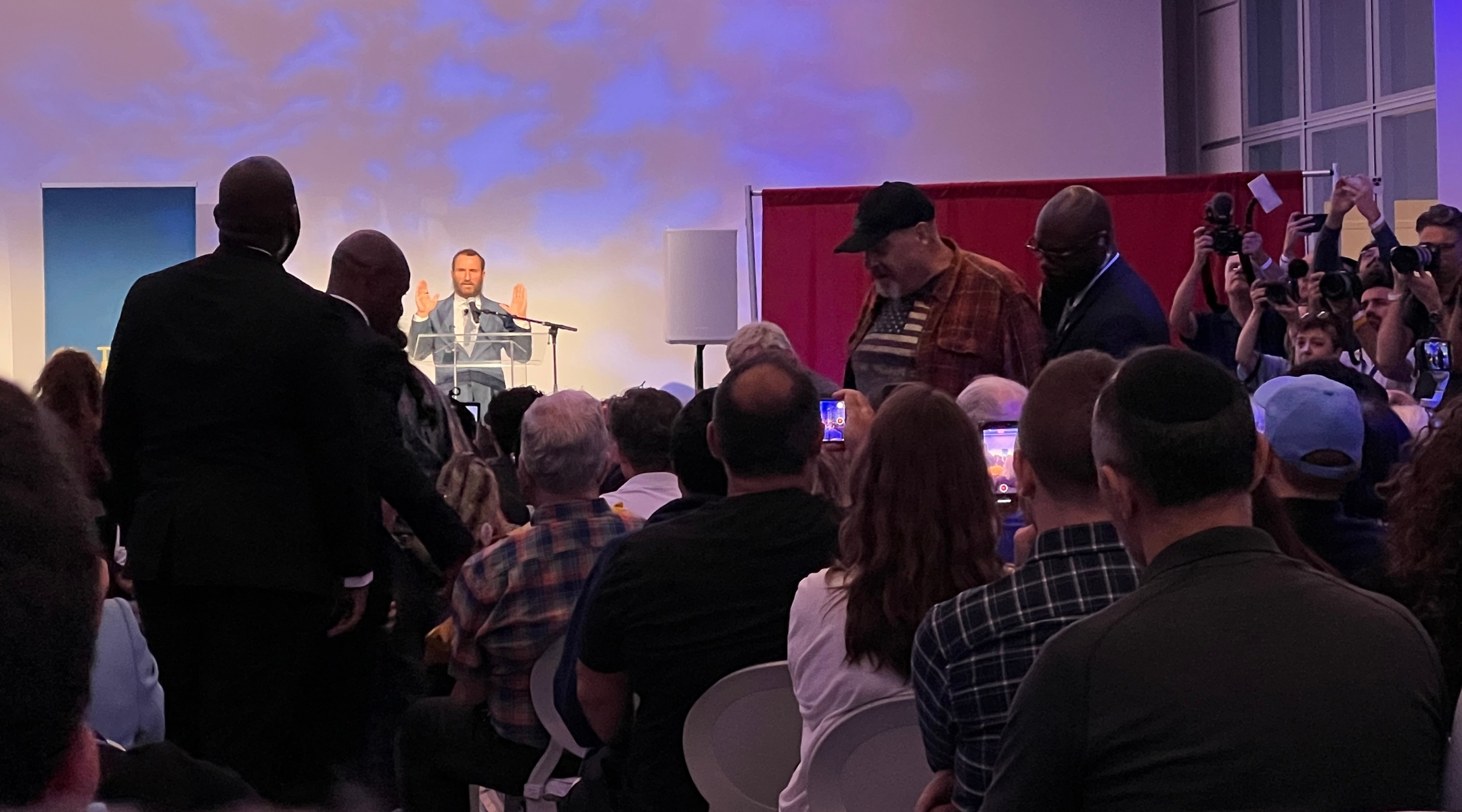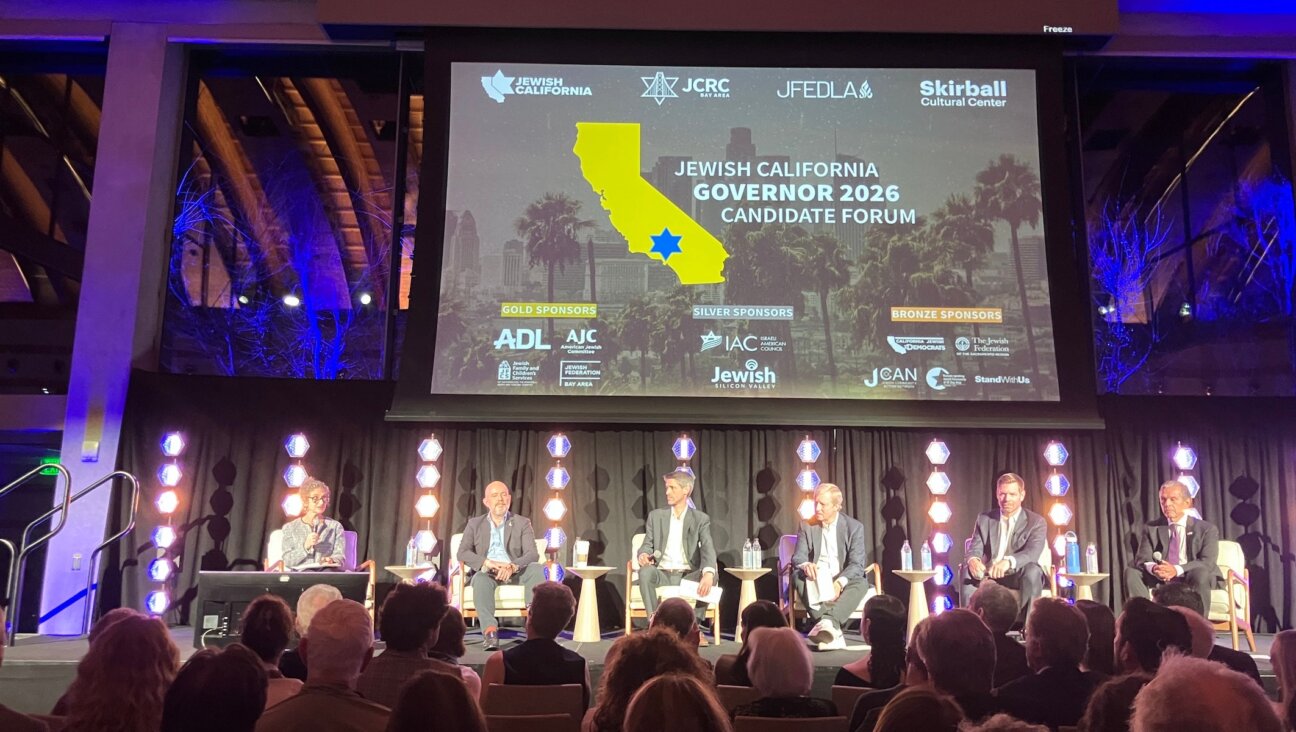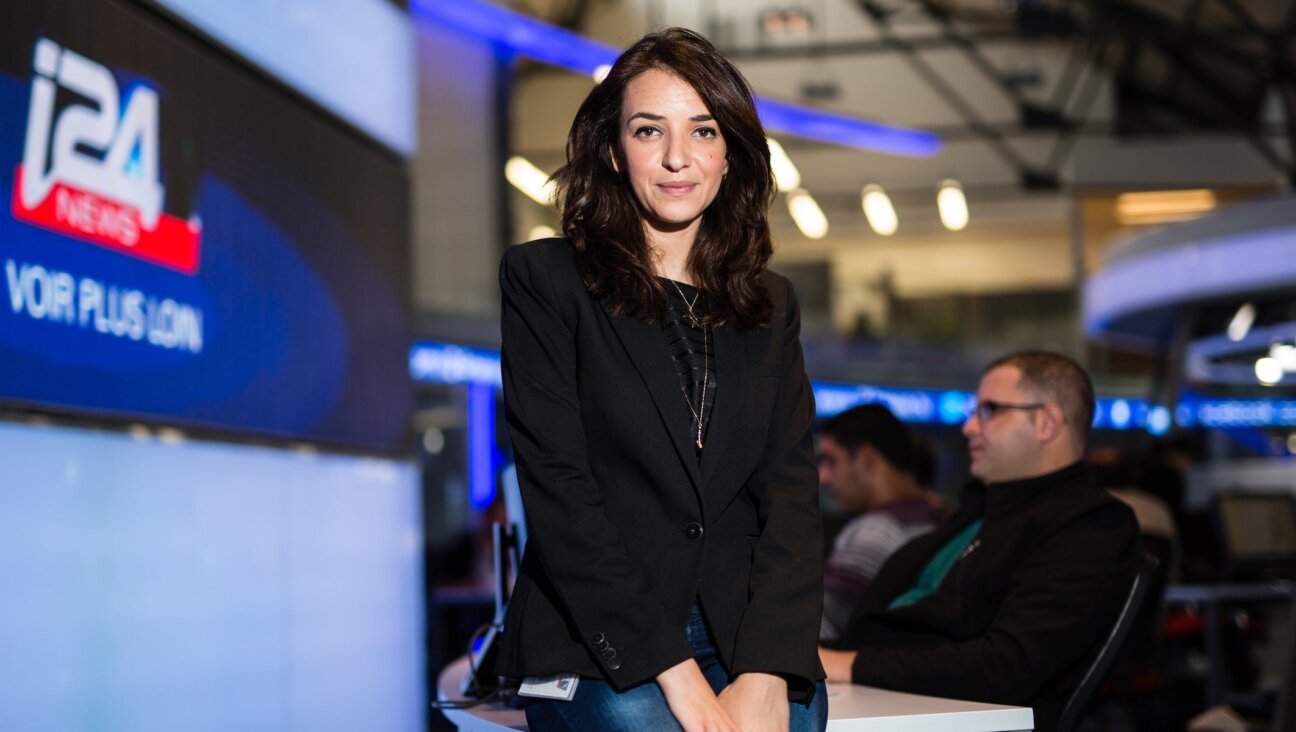RFK Jr. on the people to blame for COVID: ‘We know who they were and they weren’t Jewish’
Kennedy also denounced antisemitism while defending his record on the Jews in an event organized by Rabbi Shmuley Boteach

Presidential candidate Robert F. Kennedy Jr. at an event with Rabbi Shmuley Boteach in New York on July 25, 2023. (Jackie Hajdenberg)
(JTA) — Speaking at an event geared toward Jewish voters on Tuesday night, Robert F. Kennedy, Jr., said, “The charge of antisemitism is one that cuts me.”
Kennedy, the anti-vaccine conspiracy theorist and Democratic presidential candidate, was responding to mounting backlash against his claim that COVID-19 was “ethnically targeted” to avoid Jews and Chinese people. That remark, made without evidence at a campaign event earlier this month on the Upper East Side, led to criticism from a range of figures including Jewish leaders and Democrats in Congress. He has denied that it was antisemitic.
At the Tuesday event, Kennedy got a chance to defend his record on the Jews, courtesy of Rabbi Shmuley Boteach, the author and former Republican congressional candidate.
The appearance in Hell’s Kitchen drew hundreds of attendees, including Kennedy supporters, the Kennedy-curious and a smattering of hecklers. Boteach referred to Kennedy as a “trusted ally and friend” and offered him a platform to expound on Israel and antisemitism.
But Kennedy also expanded on the “ethnically targeted” claim: “It would not have been engineered by Jews in any case,” he said. Referring to the people he believes are culpable for COVID’s spread, he added, “We know who they were and they weren’t Jewish.”
(There is no evidence that any ethnic groups are less vulnerable to COVID, which has killed nearly 7 million people worldwide.)
This is not the first time Kennedy has been accused of using anti-Jewish rhetoric to advance his baseless claims about medical issues. He has previously apologized for using the word “holocaust” to describe legislation mandating vaccines for children and, last year, for invoking Anne Frank at an anti-vaccine rally. He has also walked back praise of Roger Waters, the former Pink Floyd frontman and vehement critic of Israel who has been widely slammed for using Holocaust imagery during his concerts.
Kennedy, 69, said on Tuesday that he was friends with Holocaust survivors and their descendants.
“I understand the pain of antisemitism to those people, and I do not want to contribute to that thing,” he said. At another point, he said, “I’m aware of the history of blood libels and how that kind of information is used by malicious people to drum up hatred of Jews.”
Kennedy’s statements almost prevented the event from taking place. On Monday, Boteach announced on social media that the venue that was originally slated to host the event, the New York Society for Ethical Culture, had backed out. In a statement to the Jewish Telegraphic Agency, that venue said hosting Kennedy would be “inconsistent with the longstanding principles and values of the Society.” The statement did not detail its objections.
But Boteach found an alternate space for the conversation, where he defended Kennedy from the accusations. He presented the conversation as the first in a series of events with presidential candidates put on by his organization, the World Values Network. The event was originally billed as “The Case for Israel,” a tagline that was later changed to “Fighting Antisemitism. Championing Israel.”
At another point, Boteach said two prominent Jewish Democrats, Reps. Debbie Wasserman Schultz of Florida and Josh Gottheimer of New Jersey, “owe Bobby Kennedy an apology for calling him antisemitic and saying he’s an embarrassment to the Kennedy name.”
Gottheimer had called Kennedy “a disgrace to the Kennedy name and the Democratic Party.” Wasserman Schultz was one of the lawmakers who initiated a letter by 102 Democrats last week calling for Kennedy to be disinvited from testifying to Congress. Gottheimer also called for the invitation to be revoked.
“If you’re an antisemite, then I am funnier than Larry David,” Boteach told Kennedy, sparking some polite laughter from the crowd.

A disruptor is escorted out of an event with presidential candidate Robert F. Kennedy Jr. on July 25, 2023. (Jackie Hajdenberg)
Boteach and Kennedy also spoke extensively about Israel. Throughout their conversation, Boteach referred to the legacy of Kennedy’s father, former Sen. Robert F. Kennedy, who was assassinated during his 1968 presidential campaign by Sirhan Sirhan. Sirhan, a Palestinian, has expressed anger over the elder Kennedy’s support for Israel during the 1967 Six Day War.
But the younger Kennedy has cast doubt on Sirhan’s guilt, visiting him in prison in 2018 and telling the Washington Post that “the wrong person might have been convicted of killing my father.”
(At one point, a woman from the crowd backed that idea, declaring that Sirhan was not the assassin. She was escorted out of the room by security, as were two more people who interrupted the event, including one Kennedy supporter.)
Boteach has praised Kennedy’s opposition to President Joe Biden’s attempts to rejoin the agreement curbing Iran’s nuclear program. They also discussed Israel’s widely reported possession of nuclear weapons, something the Israeli government, as a longstanding policy, has aimed to keep shrouded in ambiguity.
Kennedy referred to Israel’s nuclear capabilities as a matter of fact, itself a highly unusual acknowledgement by a presidential candidate. “Israel’s use of that nuclear weapon is not going to happen unless it’s attacked,” he said.
On Iran, COVID and a range of other issues, Kennedy’s declared policies are out of step with the Democratic Party’s mainstream. His long-shot campaign, meanwhile, has garnered praise from a number of figures on the right. Morton Klein, the president of the Zionist Organization of America, has reportedly advised him on Israel issues, and the ZOA recently praised what it called Kennedy’s “strong support for Israel.”
But on at least one topic, Kennedy’s views accord with Biden’s: opposition to the right-wing Israeli government’s judicial overhaul, which has aimed to sap the Supreme Court of its power and independence. The first piece of the overhaul was enacted this week amid protest.
“I’m very proud of the Israeli Supreme Court,” Kennedy said. “I don’t want to see it dismantled. I think it is a source of pride.”
This article originally appeared on JTA.org.















